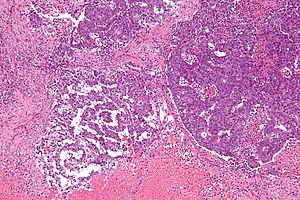Difference between revisions of "Mixed germ cell tumour"
Jump to navigation
Jump to search
(+ref) |
(more) |
||
| Line 42: | Line 42: | ||
Note: | Note: | ||
*† Numbers vary between sources. One series suggests it is almost 70%.<ref name=pmid15017200>{{Cite journal | last1 = Mosharafa | first1 = AA. | last2 = Foster | first2 = RS. | last3 = Leibovich | first3 = BC. | last4 = Ulbright | first4 = TM. | last5 = Bihrle | first5 = R. | last6 = Einhorn | first6 = LH. | last7 = Donohue | first7 = JP. | title = Histology in mixed germ cell tumors. Is there a favorite pairing? | journal = J Urol | volume = 171 | issue = 4 | pages = 1471-3 | month = Apr | year = 2004 | doi = 10.1097/01.ju.0000116841.30826.85 | PMID = 15017200 }}</ref> | *† Numbers vary between sources. One series suggests it is almost 70%.<ref name=pmid15017200>{{Cite journal | last1 = Mosharafa | first1 = AA. | last2 = Foster | first2 = RS. | last3 = Leibovich | first3 = BC. | last4 = Ulbright | first4 = TM. | last5 = Bihrle | first5 = R. | last6 = Einhorn | first6 = LH. | last7 = Donohue | first7 = JP. | title = Histology in mixed germ cell tumors. Is there a favorite pairing? | journal = J Urol | volume = 171 | issue = 4 | pages = 1471-3 | month = Apr | year = 2004 | doi = 10.1097/01.ju.0000116841.30826.85 | PMID = 15017200 }}</ref> | ||
*There has been in increase in MGCTs over the past 20 years that is probably due to changes how in how [[germ cell tumours|GCT]]s are classified classification.<ref name=pmid21623833>{{Cite journal | last1 = Trabert | first1 = B. | last2 = Stang | first2 = A. | last3 = Cook | first3 = MB. | last4 = Rusner | first4 = C. | last5 = McGlynn | first5 = KA. | title = Impact of classification of mixed germ-cell tumours on incidence trends of non-seminoma. | journal = Int J Androl | volume = 34 | issue = 4 Pt 2 | pages = e274-7 | month = Aug | year = 2011 | doi = 10.1111/j.1365-2605.2011.01187.x | PMID = 21623833 }}</ref> | |||
==Microscopic== | ==Microscopic== | ||
Features: | Features: | ||
Revision as of 21:33, 20 July 2013
| Mixed germ cell tumour | |
|---|---|
| Diagnosis in short | |
 Mixed germ cell tumour. H&E stain. | |
|
| |
| LM | depends on the components |
| LM DDx | other germ cell tumours |
| IHC | variable |
| Site | ovary, testis, mediastinum, other |
|
| |
| Signs | mass lesion |
Mixed germ cell tumour, abbreviated MGCT, is a lesion composed of different germ cell tumours. Most germ cell tumours are mixed.
General
- 60% of GCTs are mixed. †
Common combinations:
- Teratoma + embryonal carcinoma + endodermal sinus tumour (yolk sac tumour) (TEE).
- Seminoma + embryonal (SE).
- Teratoma + embryonal +(TE).
Memory device: TEE + all combinations have embryonal carcinoma.
Note:
- † Numbers vary between sources. One series suggests it is almost 70%.[1]
- There has been in increase in MGCTs over the past 20 years that is probably due to changes how in how GCTs are classified classification.[2]
Microscopic
Features:
- Depends on components.
Notes:
- If one cannot identify the component... it is probably yolk sac as this has so many different patterns.
Images
www:
- Mixed germ cell tumour - several images (upmc.edu).
- Mixed germ cell tumour - several cases (upmc.edu).
IHC
- Beta-hCG +ve - if syncytiotrophoblasts are present.
- AFP +ve - a yolk sac tumour component is present.
- GFAP +ve - if neuroepithelium is present.
See also
References
- ↑ Mosharafa, AA.; Foster, RS.; Leibovich, BC.; Ulbright, TM.; Bihrle, R.; Einhorn, LH.; Donohue, JP. (Apr 2004). "Histology in mixed germ cell tumors. Is there a favorite pairing?". J Urol 171 (4): 1471-3. doi:10.1097/01.ju.0000116841.30826.85. PMID 15017200.
- ↑ Trabert, B.; Stang, A.; Cook, MB.; Rusner, C.; McGlynn, KA. (Aug 2011). "Impact of classification of mixed germ-cell tumours on incidence trends of non-seminoma.". Int J Androl 34 (4 Pt 2): e274-7. doi:10.1111/j.1365-2605.2011.01187.x. PMID 21623833.

